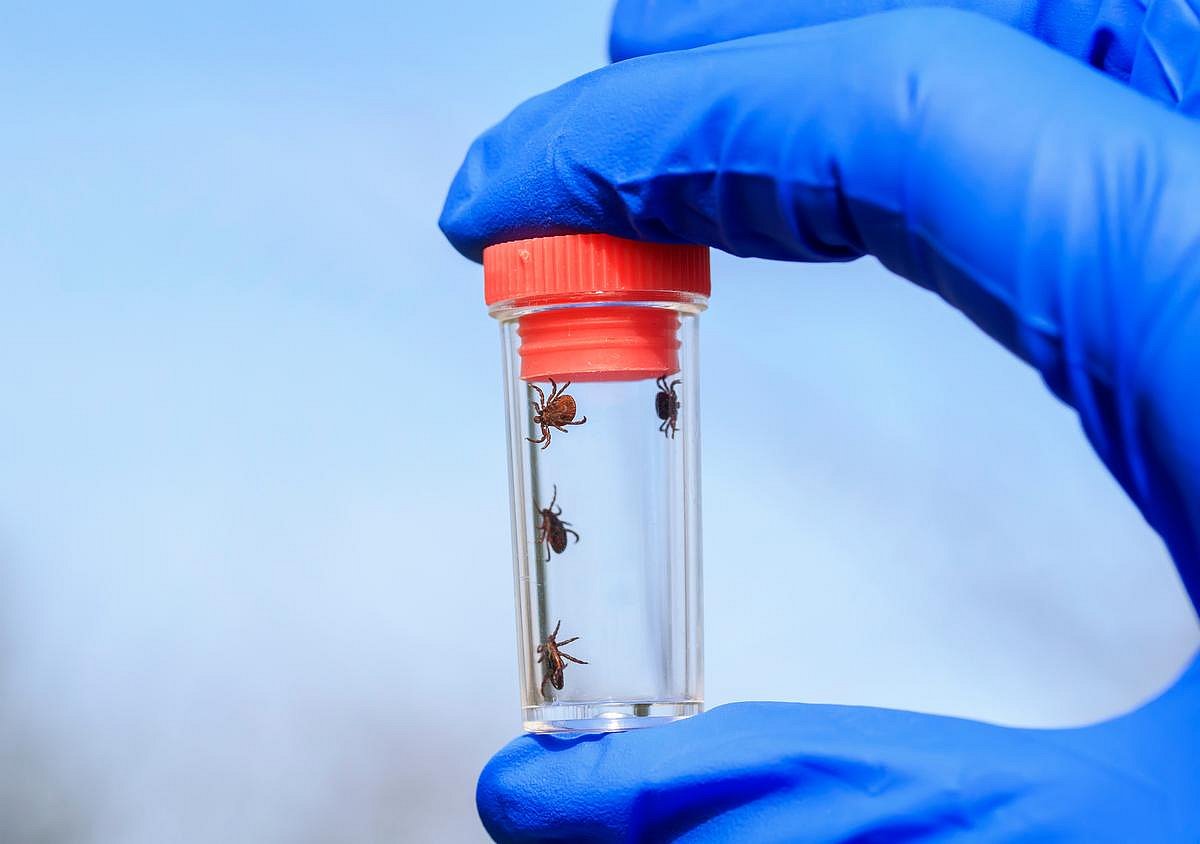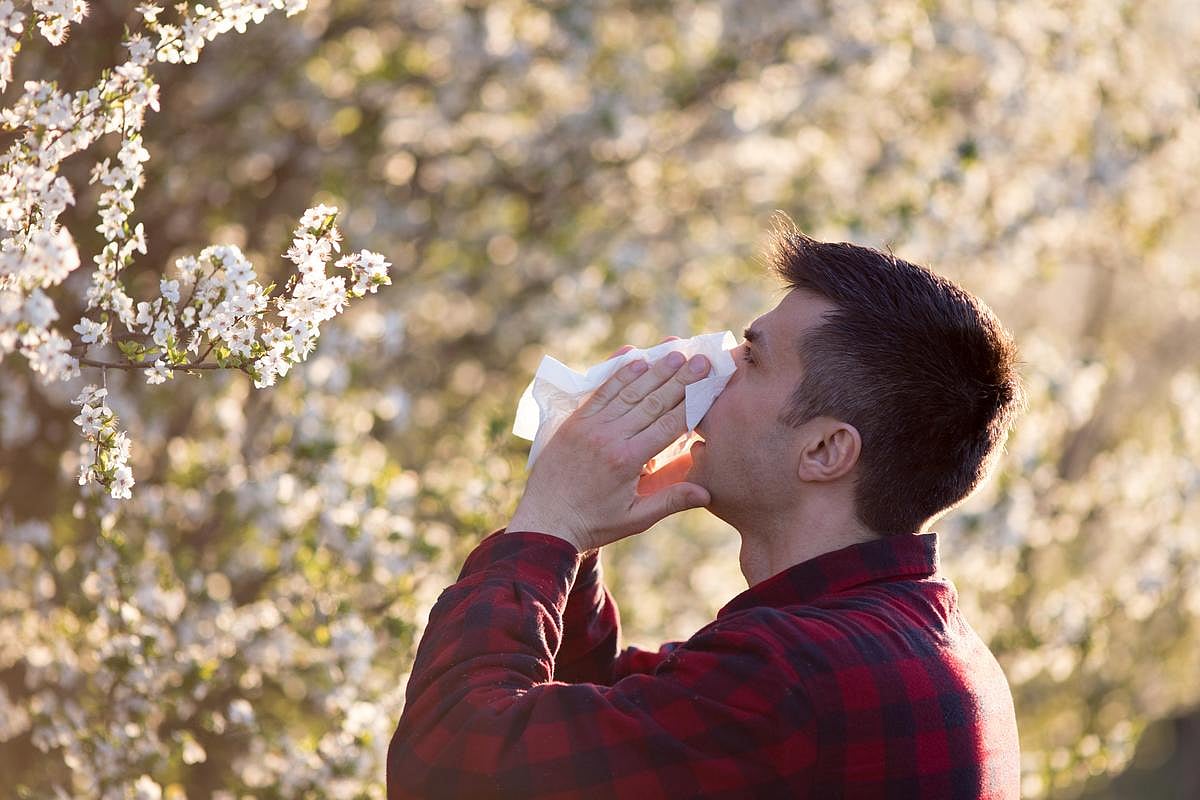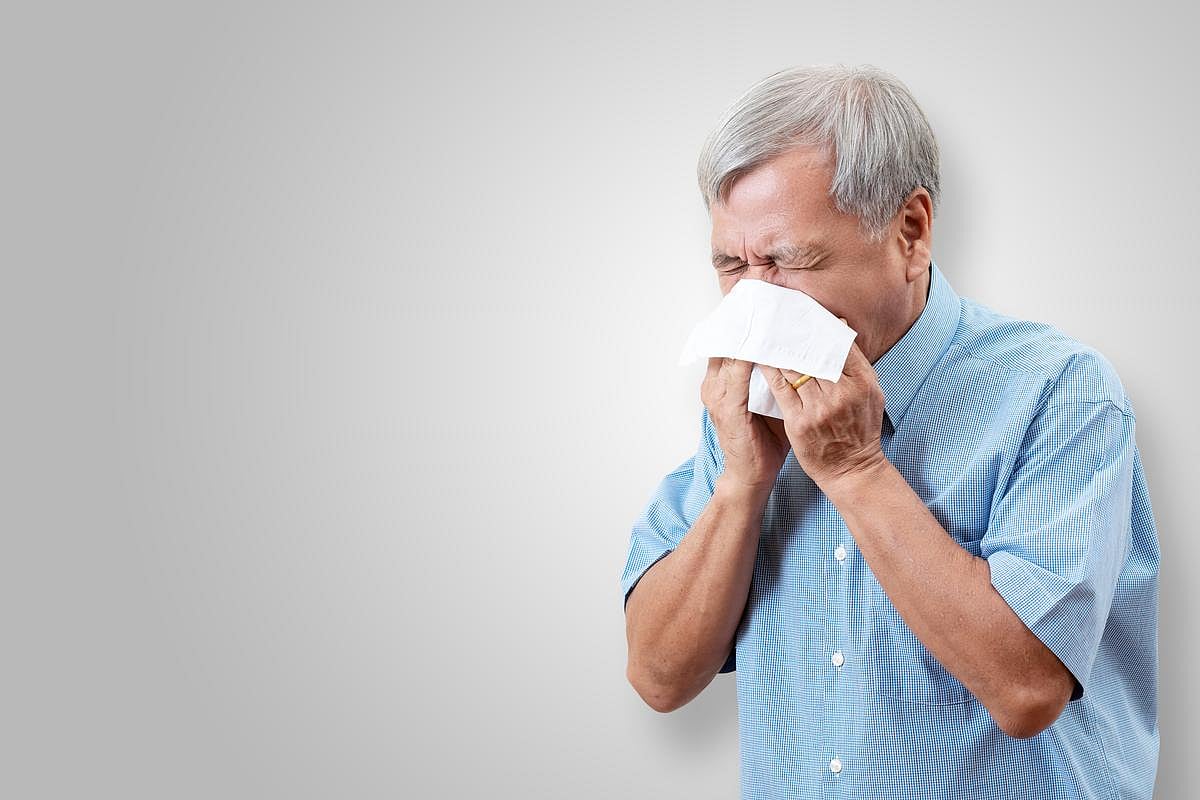Manténgase sano!
Resultados de su búsqueda "Allergies: Misc.".
24 Apr
Frequent Use of Antibiotics in Infants and Toddlers May Increase Asthma/Allergy Risk
A new study finds frequent use of antibiotics in children under 2 significantly increases their risk for asthma, food allergies and hay fever.
Resultados de noticias de salud - 109
Making resolutions for the new year?
Keep in mind that small ones can make a big difference if you have allergies or asthma.
"Simple lifestyle adjustments and preventative care can make a meaningful difference for people managing these conditions," said allergist Dr. Cherie Zachary, president of the...
- Carole Tanzer Miller HealthDay Reporter
- |
- December 28, 2025
- |
- Página completa
Feeding babies foods containing peanut as early as possible can help prevent peanut allergy.
But many parents remain confused about this tactic and require more support to get it right, according to results published Dec. 18 in JAMA Network Open.
Mistaken beliefs lead some parents to refuse o...
- Dennis Thompson HealthDay Reporter
- |
- December 22, 2025
- |
- Página completa
Farm kids tend to have far fewer allergies than urban children, and a new study offers one possible explanation: The milk provided by breastfeeding moms.
Children who grow up in farming communities have immune systems that mature faster, with higher levels of protective antibodies during their first year of life, researchers reported Dec. 10 in
The holidays: Twinkling lights, family dinners and packed travel plans. Plus, a surge of allergy and asthma triggers that can turn the season stressful for some folks.
But with a little planning, you can enjoy the celebrations without spending them sniffing, itchy or reaching for tissues.
"The holidays are a wonderful time to reconnect with loved ones, but they can also bring unexpe...
- I. Edwards HealthDay Reporter
- |
- November 23, 2025
- |
- Página completa
You may have seen recent news stories reporting that a national data investigation found that routine childhood vaccination is slipping across much of the United States, leaving classrooms and daycares with growing gaps in protection against highly contagious dis...
- Todd A. Mahr, MD, Executive Medical Director, American College Of Allergy, Asthma And Immunology HealthDay Reporter
- |
- October 23, 2025
- |
- Página completa
Seasonal allergies are considered an annoyance to most, and maddening to some.
Few think of seasonal sniffles and sneezes as potentially fatal — but we might be overlooking the danger they pose, a new study warns.
High pollen counts are linked to a significant increase in suicide risk, according t...
- Dennis Thompson HealthDay Reporter
- |
- October 6, 2025
- |
- Página completa
People with extreme, life-threatening allergic reactions might do as well to use a nasal spray as jab themselves in a thigh with an EpiPen, a new evidence review says.
Adrenaline delivered with liquid or powder nasal sprays is as effective, and sometimes even bett...
- Dennis Thompson HealthDay Reporter
- |
- October 2, 2025
- |
- Página completa
When people hear about anaphylaxis, they often associate the severe allergic reaction with food allergies. And while food allergies can cause anaphylaxis, allergies to insect stings, medications and latex can also trigger the response.
Anaphylaxis is rare. In most cases, people with allergies develop mild to moderate symptoms, such as watery eyes, a runny nose or a rash. But sometimes, ex...
- Todd A. Mahr, MD, Executive Medical Director, American College Of Allergy, Asthma And Immunology HealthDay Reporter
- |
- September 11, 2025
- |
- Página completa
Back-to-school is an exciting time for kids and parents, but it also marks the beginning of fall allergies as well as the cold and flu season.
So on top of gathering clothes and books and school supplies, parents also might have to figure out why their child has a runny nose.
“It is very confusi...
- Dennis Thompson HealthDay Reporter
- |
- September 11, 2025
- |
- Página completa
COVID-19 infection might increase a person’s risk of developing asthma, seasonal allergies and long-lasting sinus problems, a new study says.
However, vaccination appears to reduce this risk, researchers report in the Journal of...
- Dennis Thompson HealthDay Reporter
- |
- August 22, 2025
- |
- Página completa
Ritz peanut butter cracker sandwiches are being recalled due to the possible presence of undeclared peanuts, a major allergen.
The affected products contain individually wrapped packs that may have been mislabeled as cheese sandwiches instead of peanut butter ones, according to Newsweek. The outer cartons were labeled correctly and indicated the presence of peanuts.
...- HealthDay Reporter
- Denise Mann
- |
- July 25, 2025
- |
- Página completa
Household mold can be a significant trigger for a rare but potentially debilitating lung disease that can cause permanent breathing problems, a new study says.
Mold appears to be the primary cause for nearly a quarter (23%) of 231 cases of hypersensitivity pneumonitis (HP) treated at the University of Texas Southwestern Medical Center in Dallas, researchers report in the journal
- HealthDay Reporter
- Dennis Thompson
- |
- July 14, 2025
- |
- Página completa
TUESDAY, July 1, 2025 (HealthDay News) —Exposure to wildfire smoke might make some people more likely to fall ill by altering their immune systems, a new study says.
Fire smoke appears to affect the immune system on a cellular level, researchers report in the journal Nature Medicine.
People exposed to sm...
- HealthDay Reporter
- Dennis Thompson
- |
- July 1, 2025
- |
- Página completa
Many kids are spending a lot of unnecessary time under observation in a hospital following a sudden allergic emergency, a new study concludes.
About 17% of kids are admitted for overnight observation following a scary allergic reaction to food, medicine or insect bites, researchers reported.
But...
- HealthDay Reporter
- Dennis Thompson
- |
- June 27, 2025
- |
- Página completa
If spending time around dogs or cats makes your eyes water, your nose run, your skin itch or your breathing difficult, you’re not alone.
Pet allergies — allergic reactions to proteins found in an animal's skin cells, saliva or urine — affect 10% to 20% of people worldwide, and exposure isn’t limited to pet owners.
Scientists at the National Institute of Env...
- HealthDay Reporter
- Todd A. Mahr, MD, Executive Medical Director, American College Of Allergy, Asthma And Immunology
- |
- June 25, 2025
- |
- Página completa
Out of concern, many parents might be spoiling their child’s best chance to avoid developing a food allergy, a new study says.
Allergy experts recommend children at risk of food allergies start being introduced to small amounts of highly allergenic foods starting at 4 to 6 months of age.
But some parents are waiting a year or more to introduce these foods, increasing the risk ...
- HealthDay Reporter
- Dennis Thompson
- |
- June 10, 2025
- |
- Página completa
The TikTok video shows a teenage girl in braces applying a series of 14 beauty products to her face, an arsenal that costs nearly $350 all told.
It’s one of many such videos where girls share their beauty regimens — but then something goes wrong.
“This is what my skin looks like. It is very glowy right now, I love it! But also, I just had some allergic reaction to ...
- HealthDay Reporter
- Dennis Thompson
- |
- June 10, 2025
- |
- Página completa
Overuse of antibiotics might increase kids’ risk of developing asthma and allergies, by disrupting their gut bacteria during a crucial stage of child development, a new study says.
Exposure to antibiotics prior to age 2 is associated with a 24% increased risk of asthma and 33% increased risk of food al...
- HealthDay Reporter
- Dennis Thompson
- |
- April 23, 2025
- |
- Página completa
Spring has sprung, and the battle with seasonal allergies is underway in earnest.
But there’s a lot folks can do to manage their pollen-produced misery, according to Dr. Zachary Rubin, a Chicago-area pediatrician and allergy...
- HealthDay Reporter
- Dennis Thompson
- |
- April 18, 2025
- |
- Página completa
Spring is officially here, and with it comes watery eyes, stuffy noses and constant sneezing for people with seasonal allergies.
And climate change means things are only going to get worse for allergy sufferers, a new evidence review suggests.
Allergy seasons are expected to get longer and grow mo...
- HealthDay Reporter
- Dennis Thompson
- |
- April 11, 2025
- |
- Página completa
The world’s first baby conceived through robot-controlled fertilization has been born, researchers say.
The boy was born to a 40-year-old woman in Guadalajara, Mexico, following a previous in vitro fertilization (IVF) attempt that had produced only one mature egg and no embryos, r...
- HealthDay Reporter
- Dennis Thompson
- |
- April 11, 2025
- |
- Página completa
Eviction bans implemented during the COVID-19 pandemic had an unexpected positive benefit for America’s children, a new study says.
Reports of physical abuse, sexual abuse and child neglect all fell during U.S. eviction bans, researchers reported April 8 in the journal
A rare red meat allergy, usually linked to a bite from the lone star tick, may also be caused by other tick species found in different parts of the U.S., a new report shows.
“Alpha-gal syndrome is relatively rare, but those who have it can have a full-on anaphylactic shock,” Douglas Norris, a professor of ...
- HealthDay Reporter
- I. Edwards
- |
- March 24, 2025
- |
- Página completa
Spring brings warmer weather, but for allergy sufferers, it also means sneezing, wheezing and itchy eyes. Instead of enjoying the season, you may be battling congestion and brain fog. So, what can you do to manage your spring allergy symptoms?
Spring allergy treatments range from simple lifestyle changes to more advanced medical interventions. By taking a graduated approach, you may...
- HealthDay Reporter
- Todd A. Mahr, MD, Executive Medical Director, American College Of Allergy, Asthma And Immunology
- |
- March 1, 2025
- |
- Página completa
Most parents of a child with a food allergy opt to cut the offending food completely out of their homes.
However, that strategy is tied to an emotional toll, researchers said.
Parents who exclude food from their home because of their child’s allergy have a worse quality ...
- HealthDay Reporter
- Dennis Thompson
- |
- January 21, 2025
- |
- Página completa
FRIDAY, Dec. 20, 2024 (HealthDay News) -- Holy chip! Frito-Lay has issued a limited recall of select 13-oz bags of Lay’s Classic Potato Chips due to the potential presence of undeclared milk, which could pose a serious health risk to individuals with a milk allergy.
According to a report released by the
Winter is here, and that can make it difficult for those with asthma to control their symptoms.
The cold air that comes with cooler temperatures can contribute to asthma flare-ups, as can increased respiratory infections and seasonal allergies.
It’s essential to manage your asthma to keep yourself healthy throughout the season. Some of the strategies mentioned below will help...
- HealthDay Reporter
- Todd A. Mahr, MD, Executive Medical Director, American College Of Allergy, Asthma And Immunology
- |
- December 18, 2024
- |
- Página completa
There’s fungus among us, and it might be making allergies and asthma worse.
People with allergy sniffles and asthma have different fungal colonies in their noses than folks who don’t suffer respiratory allergies, researchers report Dec. 16 in the journal
Heavy smoke from wildfires more frequently chokes the skies over the Western United States, but cities farther to the east are no longer being spared, new research shows.
Canada’s unusually intense 2023 wildfire season smothered American cities as far off as Baltimore and New York City, according to research...
- HealthDay Reporter
- Dennis Thompson
- |
- December 10, 2024
- |
- Página completa
Anaphylaxis involves a sudden, potentially life-threatening reaction to an allergen, including even very small amounts of food allergens such as egg or peanut.
Now, two studies find that people with allergies, as well as those charged with their care, are often unsure what to do when anaphylaxis strikes, and how soon.
Too often, patients were hesitant to get emergency help when ne...
- HealthDay Reporter
- Ernie Mundell
- |
- October 25, 2024
- |
- Página completa
Folks with peanut allergies don’t have to worry that someone might be munching on the nuts during an airline flight, researchers report.
It turns out there’s no evidence to the commonly held belief that nut allergens can be spread through aircraft ventilation systems, a new review co...
- HealthDay Reporter
- Dennis Thompson
- |
- October 16, 2024
- |
- Página completa
Consumers should be aware that some chocolate labeled as “dairy-free” actually contains milk, the U.S. Food and Drug Administration warns.
This inaccurate labeling could put people with milk allergies in danger, the FDA noted.
About 13 of 210 chocolate samples sold in Pennsylvania and Michigan in 2022 and 2023 tested positive for milk, the FDA said in an agency news rele...
- HealthDay Reporter
- Dennis Thompson
- |
- September 19, 2024
- |
- Página completa
Folks nervous about administering a rescue shot for anaphylaxis finally have a new alternative in a nasal spray.
The U.S. Food and Drug Administration on Friday announced that it has approved neffy, the first non-injected treatment for life-threatening allergic reactions.
The epinephrine nasal spray is for use by adults and children who weigh more than 66 pounds, the agency said.
- HealthDay Reporter
- Ernie Mundell
- |
- August 9, 2024
- |
- Página completa
As kids and teens prepare to head back to school, parents might not have protecting their child's lung health on the top of their to-do lists. But experts say it should be.
“A new school year often means a new environment for students and staff, including new asthma triggers, exposure to new viruses, peer pressure to smoke or vape and other stressors that can impact the health of st...
- HealthDay Reporter
- Robin Foster
- |
- August 3, 2024
- |
- Página completa
Bad news for Olympians headed to Paris -- high levels of ozone pollution and grass pollen are likely during the upcoming games if hot, sunny weather prevails, researchers said.
Ozone levels in Paris and its environs tend to exceed World Health Organization (WHO) recommended thresholds about 20 days per month between July and September, according to an analysis of air quality monitoring da...
- HealthDay Reporter
- Dennis Thompson
- |
- July 26, 2024
- |
- Página completa
The U.S. Food and Drug Administration has sent a warning letter to one of America's biggest bakeries, asking the company to stop claiming there are allergens such as sesame or nuts in products when in fact they are not there.
In a statement release...
- HealthDay Reporter
- Ernie Mundell
- |
- June 28, 2024
- |
- Página completa
People with seasonal allergies often turn to over-the-counter and prescription medicines to relieve symptoms like coughing, sneezing, runny nose, congestion and itchy eyes, nose or throat.
But they often aren't aware that these meds -- including antihistamines -- have as much risk for potential side effects, drug interactions and overdose as other drugs.
"All medicines have side eff...
- HealthDay Reporter
- Dennis Thompson
- |
- May 18, 2024
- |
- Página completa
U.S. recalls of foods for salmonella, foreign objects or undeclared allergens are rampant nowadays and the highest they've been since 2020, a watchdog group warns.
"Everyone needs to do better: food producers, regulators and lawmakers,"said Teresa Murray, consumer watchdog at U.S. Public Interest Research Group (PIRG). "We shouldn't ha...
- HealthDay Reporter
- Ernie Mundell
- |
- April 25, 2024
- |
- Página completa
Preparing a kid for summer camp is already a daunting task, and it's even more complicated if your child has allergies or asthma, experts say.
"Kids with allergies and asthma need an extra layer of protection when they head off to summer camp,"said allergist Dr. Gailen Marshall Jr., president of the America...
- HealthDay Reporter
- Dennis Thompson
- |
- April 13, 2024
- |
- Página completa
Spring is in the air, and along with it loads of tree, grass and weed pollen.
Sneezing, watery and itchy eyes, runny nose and all the other miseries of seasonal allergies can prevent a person from fully enjoying the season of rebirth.
Worse, seasonal allergies also can trigger or worsen asthma, or lead to health problems like sinus and ear infections, according to the U.S. Food and ...
- HealthDay Reporter
- Dennis Thompson
- |
- April 9, 2024
- |
- Página completa
Allergic reactions can range from mild sneezing to life-threatening episodes where the throat closes and the airways tighten.
That's why people need to prepare themselves for any potential allergies they might have, said Dr. Sanjiv S...
- HealthDay Reporter
- Dennis Thompson
- |
- April 1, 2024
- |
- Página completa
Slicing some fresh limes for that margarita savored in the sun could be a bad combo for some people's skin, dermatologists warn.
Folks can break out in what are nicknamed "margarita rashes" if they are skin-sensitive to certain fruits or vegetables and then get sun exposure soon after. The medical term for these outbreaks is photocontact dermatitis.
"Sun sensitivity is a common cond...
- HealthDay Reporter
- Ernie Mundell
- |
- March 11, 2024
- |
- Página completa
Food allergies are difficult to manage at any age, but college students face complex challenges when it comes to navigating the dangers posed by the possibility of life-threatening anaphylaxis.
A recent review published in the Annals of Allergy, Asthma and Immunology, the journal of the
What if you'd been treated for years for a condition, only to find out that you'd long ago been misdiagnosed?
That's what's happening to a sizable number of Americans who are taking allergy meds (to little effect) when in fact they have chronic rhinosinusitis (CRS), a new study contends.
"We have seen so many patients suffer for so long due to the confusion between allergies and CRS...
- HealthDay Reporter
- Ernie Mundell
- |
- February 28, 2024
- |
- Página completa
Stuffy, sneezing, miserable: folks plagued by chronic sinusitis know the feeling all too well.
Experts at University of Cincinnati Health say it's also an all-too-common affliction, affecting an estimated 14.6% of Americans.
What is chronic sinusitis?
The sinuses are air-filled spaces in the skull at the back of the face, and they rely on mucus to stay moist a...
- HealthDay Reporter
- Ernie Mundell
- |
- February 27, 2024
- |
- Página completa
Spring allergies bring to mind thoughts of stuffy noses and watery eyes.
But allergies actually affect many different and interconnected systems within a person's body, according to the American College of Allergy, Asthma and Immunology (ACAAI).
"Spring allergens such as pollen, mold spores and other airborne particles not only trigger nasal allergies, but also can have a profound e...
- HealthDay Reporter
- Dennis Thompson
- |
- February 17, 2024
- |
- Página completa
If you or someone close to you suffers from severe allergic reactions, you have probably heard there are new recommendations out that offer guidance on the diagnosis, management and treatment of anaphylaxis.
The latest guidelines come from Joint Task Force on Practice Parameters, a partnership between the
- HealthDay Reporter
- Todd A. Mahr, MD, Executive Medical Director, American College Of Allergy, Asthma And Immunology
- |
- January 23, 2024
- |
- Página completa
Fetal exposure to opioids may change a baby's immune system, triggering a rise in risks for eczema and asthma through early childhood, new research shows.
Children born to women who used opioids during pregnancy had much higher rates of eczema, as well as conditions such as "diaper rash," during infancy, Australian researchers report.
These children also went on to have significantl...
- HealthDay Reporter
- Ernie Mundell
- |
- January 18, 2024
- |
- Página completa
Allergic to peanuts? To cats? To pollen?
A new targeted therapy may have the potential to help a person ward off an allergic reaction prompted by the specific source of their allergy, Northwestern University researchers report.
The therapy uses nanoparticles to deactivate mast cells, which are the immune cells responsible for immediate allergic reactions.
In a mouse study, the...
- HealthDay Reporter
- Dennis Thompson
- |
- January 18, 2024
- |
- Página completa
Drugs already used by millions to lower cholesterol might someday have a new role: Relieving asthma and COPD.
That's the hope of a new line of research underway at the University of California, Davis.
A study funded by the U.S. National Institutes of Health is seeking to determine whether a "statin inhaler" might reduce the airway inflammation that makes breathing difficult for folk...
- HealthDay Reporter
- Ernie Mundell
- |
- January 5, 2024
- |
- Página completa
.jpeg?w=1920&h=1080&mode=crop&crop=focalpoint)













.jpg?w=1920&h=1080&mode=crop&crop=focalpoint)






























